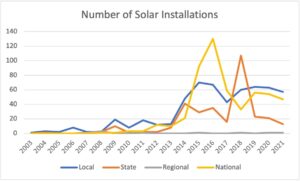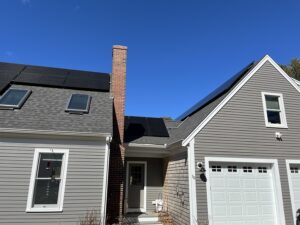EASTHAM — It’s been a pretty good decade or so for solar installations on the Outer Cape: 1,253 systems were installed on houses in the four outermost towns between 2014 and 2021 compared to just 149 installations from 2003 to 2013. That’s according to state data on solar photovoltaic systems registered in the production tracking system at the Mass. Clean Energy Center.

Most Cape Cod solar customers are happy with their installations, said Megan Amsler, the executive director of Self-Reliance, a nonprofit based in North Falmouth that advises consumers on clean energy strategies.
But as the industry has added players on the Cape and across the country, customer complaints about solar companies have risen, too.
According to a Sept. 26 Time magazine story, there were 5,331 complaints containing the words “solar panels” submitted on the Federal Trade Commission’s fraud reporting website from Jan. 1 to Sept. 19 this year, 31 percent more than in 2022. Governments have taken action, too, as evidenced by the lawsuits that attorneys general in Rhode Island, Florida, Arizona, and Minnesota have brought against solar companies for misleading business practices in just the last few months.
Local solar advocates say careful comparison shopping that includes local installers can help consumers avoid possible pitfalls.
Communication Breakdowns
Christopher Kelley, owner of Cape Cod Disposal Co. and an Eastham resident, decided to purchase panels from SunPower, a solar installation company based in San Jose, Calif. early this year.

Problems with the project began in June, Kelley said, when SunPower outsourced the installation of the panels to Incite Solar, a Pittsfield company that in turn hired a Maine-based subcontractor to do the job. Kelley does not know the name of the subcontractor, he said, because the workers did not wear uniforms and drove a U-Haul truck when they arrived on the job.
When the work was finished, several panels had been installed in the shadow of Kelley’s chimney, limiting the amount of sun that could reach them and, consequently, the amount of energy they could generate. That wasn’t according to plan, Kelley said. “When we asked them to move the panels, they said no,” he said.
Then, Kelley received the bill for his utilities in October, three months after installation. “The numbers were inaccurate,” he said. “Nothing added up.”
SunPower provides an app to monitor energy production from its solar panels, but Kelley’s was not working, so he could not monitor the panels’ productivity himself. He reached out to the company several times and got “radio silence.” Finally, he said, he got a lawyer and threatened legal action.
“I never heard back from them,” he said of SunPower, “but the app started working.”
A public relations manager from SunPower, Sanah Sadduradin, told the Independent she could not address these specific complaints. She wrote by email that “SunPower is committed to providing homeowners in Massachusetts with easy access to affordable, high-performing solar and other renewable energy products.”
While Kelley’s negative experience appears to be unusual in our area, he is not alone. Steve Miner, a Wellfleet native who lives in Harwich, told the Independent that it took over a year to reach the national installer SunCity after the company installed his panels in such way that his roof started leaking. And David Dubuque, an Eastham resident, said that his difficulties with contacting Tesla Energy’s customer service led him to file suit against the company for unfair business practices under the state’s consumer protection law, Chapter 93A.
From 2014 to 2021, national companies installed more panels here than local installers did, according to the state’s solar installation data. And national companies tend to draw the most complaints, Amsler said.
Unlike local installers, who rely more on their local reputations, Amsler said, national companies have less incentive to attend to customer’s concerns. For local companies, “the bad news usually travels way faster than the good news,” she said, but that applies less to national installers.
The reason is simple, she said: “You don’t want to bump into some mad customer at the grocery store.”
Tom McNellis, a member of the Eastham Climate Action Committee, which recently organized a workshop for people interested in going solar, said he thought consumers would do better with local installers. “They have a reputation, and they’re here for the long haul,” he said.
Part of the reason for a shift toward national installers was a change in incentives. When Richard Elkin, Wellfleet’s former representative on Cape Light Compact’s governing board, organized a push to help townspeople “solarize” in 2014, he said, the program contracted with Cotuit Solar, E2 Solar, and Blue Selenium, all local or Massachusetts-based companies.
More than 100 systems were installed in Wellfleet under that program, which was subsidized by a state effort called Solarize Mass, Elkin said. But since the mid-2010s, as state incentives have dwindled, local installers have been outpaced in most years by off-Cape and national companies that can offer cheaper rates, McNellis said.
Those cheaper rates come at the expense of customer service, Amsler and McNellis said. A common theme among complaints about big solar installers is difficulty reaching the companies themselves — a problem Kelley, Miner, and Dubuque all said they experienced.
Avoid ‘Every Which Way Solar’
One strategy that less reputable companies use, McNellis said, is to recommend installing more solar panels than a house needs. The extra energy these panels generate turns into “net metering credits,” and while they can be exchanged for energy at times when less solar energy is available, with too many panels the credits pile up faster than customers can use them.
Some companies will also recommend installing solar panels where there is insufficient sunlight, Amsler said. Panels on shaded or north-facing roofs often generate little energy. Amsler referred to these companies as “every which way solar.”
McNellis said that solar companies should use satellite and lidar data to calculate how much energy the proposed system will generate, and he recommended that customers compare that number to their typical annual electric consumption. He also said that with lidar studies, installers can see which proposed panels will generate the least energy so that those can be omitted from the final plan.
Both Amsler and McNellis said they recommend in-person consultations with potential installers.
“I always urge people to get lots of quotes — at least three,” Amsler said. McNellis agreed, adding that even if someone comes to your door with an offer for solar, compare their quote against at least two others.
Amsler suggested getting in touch with your Cape Light Compact town representative — each town has a representative on the Compact’s governing board — or your town wiring inspector for advice on installers.
Asking friends, neighbors, and town officials what they know about any installers is another good strategy, McNellis said.
Amsler agreed. “Talk to your friends and neighbors,” she said. “And you have to ask for references.”
